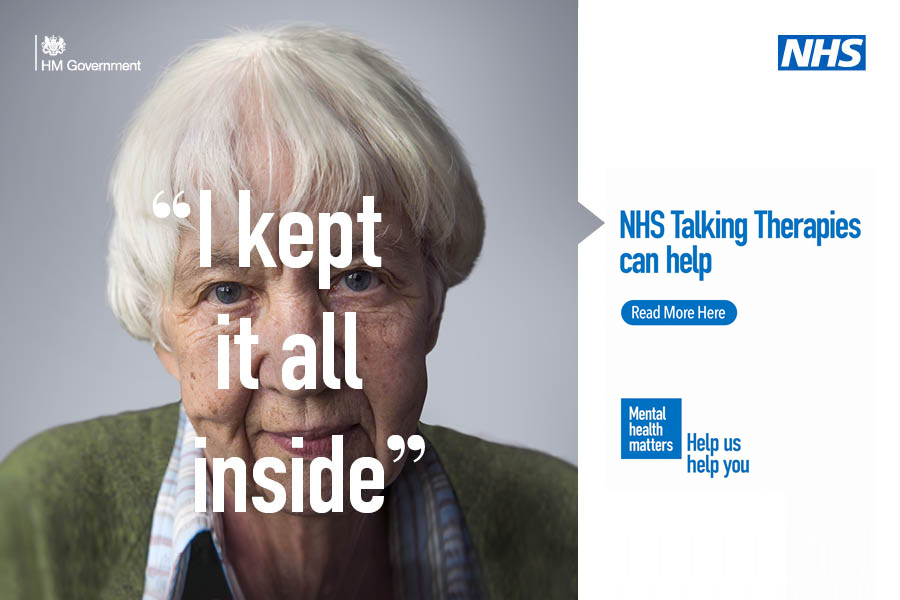NHS Talking Therapies can help
The NHS is encouraging anyone struggling with feelings of depression, or anxiety such as excessive worry, panic attacks, social anxiety, post-traumatic stress, or obsessions and compulsions, to seek help through NHS Talking Therapies services.
These are effective, confidential and free treatments delivered by trained clinicians, online, on the phone, or in person and are very effective for older people.
Talking therapies are proven to work – and they’ve been shown to work particularly well for older people, with those aged 65-74 having an overall recovery rate of 61% following treatment compared to 51% of adults aged 26-64. Despite this, older people made up just 5.6% of national referrals to NHS Talking Therapies in 2021-22, varying from 2.2% to 9.6% depending on the area. With older people making up 20% of our population, this referral rate clearly needs to change.¹
You do not need to have a diagnosed mental health problem to refer yourself to an NHS Talking Therapies service. If you’re struggling with feelings of depression or anxiety, seeking help through an NHS Talking Therapies service can be one of the best steps you can take to overcome mental health issues and get back on track, just like it did for Paul, 55, West Midlands.
Paul’s mental health issues began in 2009 during his time as a police officer, where he was diagnosed with PTSD. As a 6-foot rugby-playing detective this was something that was very difficult to admit fully to himself and others, and over the next seven years he had several breakdowns. In 2016, he had to retire due to his mental health. After researching mental health services online, he self-referred to NHS Talking Therapies and received cognitive behavioural therapy and counselling over a period of 18 months. He also received EMDR therapy.
Paul recalls, “When I first sought help through NHS Talking Therapies, I felt that someone cared immediately. Just those first conversations over the phone, and when I walked in for my first appointment and was met by the receptionists’ ‘smiley eyes’, I felt comfortable and welcomed and that someone was going to listen.”
He says his experience of these services has given him all the tools to help him cope on a daily basis. Paul now volunteers and works to help others who are in the same situation he was in, to show them a smiling face as they walk through the door for their appointments.
“I know what it’s like to be on the other side of the door, being scared to walk in and tell someone the things you have never told anyone or haven’t even admitted to yourself. Just getting through that door is such an important step to getting yourself out of a negative cycle and to building a life that is even better than the one you had before.”
NHS Talking Therapies can help provide support and treatment for common mental health problems, such as:
- feeling anxious
- feeling low and hopeless
- having panic attacks
- finding it hard to cope with work, life or relationships
- struggling with flashbacks or nightmares about upsetting events from your past
- feeling stressed
- worrying a lot
- obsessive thoughts or behaviours
- fear of social situations
- being afraid of things, such as spiders, flying or heights (phobias)
Getting support as soon as you start having difficulties can help to reduce impact.
For those whose first language is not English, talking therapies can be delivered through multi-lingual therapists or through confidential interpreters, and in British Sign Language (BSL) through Sign Health’s NHS Therapies for Deaf People service.
Your GP can refer you for NHS Talking Therapies, or you can refer yourself online at nhs.uk/talk
FIND OUT MORE ABOUT SELF-REFERRAL HERE
¹psych-ther-ann-rep-csv-2022-23-main-v2.csv spreadsheet
ADVERTORIAL




















